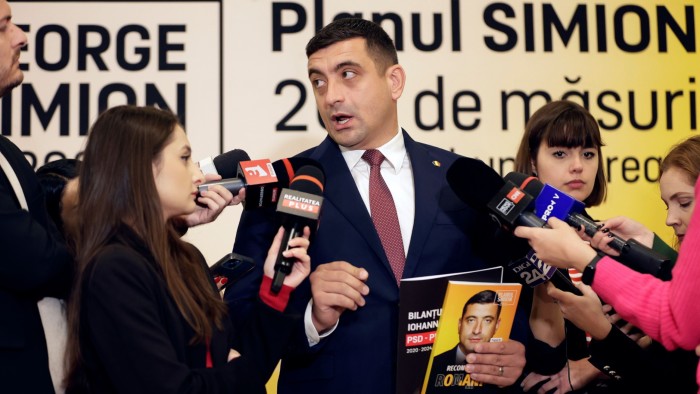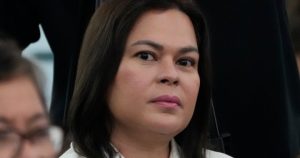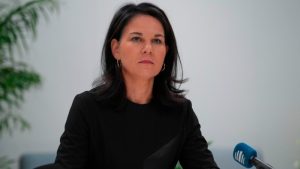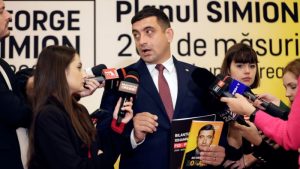Ukraine-sceptic ‘Trumpist’ gains traction ahead of Romanian vote

Unlock the Editor’s Digest for free
Roula Khalaf, Editor of the FT, selects her favourite stories in this weekly newsletter.
A far-right, Ukraine-sceptic politician who takes inspiration from Donald Trump has rocketed in Romanian voters’ preferences ahead of presidential elections on Sunday.
George Simion, a fringe anti-vaccine campaigner in the Covid-19 pandemic, is now one of Romania’s most recognisable politicians capitalising on voters’ fears of being dragged into a broader conflict with Russia.
“I challenge my opponents,” he told his contenders during a televised debate this week, urging them to swear on the Bible or the constitution that they would seek to disengage Romania from its military support for Ukraine. “I will be a president who will not involve Romania in any war. We are not ready for one.”
He walked confidently around the TV studio during breaks, phone in hand, streaming live on social media with a savvy that has become his hallmark and has propelled his far-right AUR party from total obscurity to a major political force.
Most opinion polls ahead of Sunday’s vote show Simion will probably make it into a run-off with Prime Minister Marcel Ciolacu, on December 8. According to a survey by pollster Inscop published last week, Simion attracts more than 21 per cent of people who are certain to vote, a close second behind Ciolacu, who has just shy of 25 per cent. Other candidates lag far behind.
Since no candidate is expected to secure more than half of the votes, the first two will go to a run-off on December 8. Simion’s party is on track to become the second-largest force in parliamentary elections, which are held on December 1, doubling its number of seats compared to 2020.
AUR and Simion’s strong performance comes after similar electoral successes by populist, hard-right parties in France, Germany, Austria and the Netherlands. His stance on Ukraine also mirrors that of neighbouring Hungary, where Prime Minister Viktor Orbán has consistently opposed any military support for Kyiv.
“We are a sort of Trumpist party in this new wave of political parties in Europe,” Simion told foreign journalists at his Bucharest headquarters. “With good things and with bad things. We admit this.” The US president-elect has vowed to end the war in Ukraine and cast doubt about his country’s continued financial and military aid for Kyiv.

Like his Republican role-model, Simion has vowed to “make Romania great again”, in reference to the party’s revisionist stance that seeks to annex territories inhabited by Romanians, notably in neighbouring Moldova. Simion has been barred from entering both Ukraine and Moldova for violating those countries’ sovereignty.
AUR has questioned the benefits of Romania’s membership of Nato and the EU — and argued that it would be better off if it ceased aid to Ukraine.
“The president of this country does not start [wars] but, with Bible in hand, he must defend Romanians,” a questioner challenged him during the TV debate. “Romanians, but not Ukrainians,” Simion replied without skipping a beat.
Such rhetoric earned him frequent charges of being a Kremlin agent — an accusation he firmly rejects. He has repeatedly denied having ties to Vladimir Putin and even calls the Russian leader a “war criminal”. But he often repeats Kremlin lines about peace at any cost — meaning on Moscow’s terms.
Despite his outsider status, Simion, 38, has sought to scoop up the traditional left’s disgruntled voters and is likely to force Ciolacu into a tightly fought race, said the historian and political analyst Ion M. Ioniță.
Romania’s political system is centred on the president, who nominates the prime minister, conducts coalition talks and has the last word on security and foreign policy matters. A strong presidential showing could mean more parliamentary power for AUR, Ioniță said.
“A good run in the race for president may benefit the candidates’ parties in the parliament vote, and vice versa,” he added.
It is unlikely that AUR will enter government, however, as another alliance of centrist parties is likely to form a parliamentary majority and exclude Simion’s lawmakers from any cabinet positions.
AUR stands for Alliance for the Union of Romanians and is a play on the Romanian word for ‘gold’. The party counts on the votes of millions of Romanians who are at risk of poverty — at 33 per cent the largest share of the population among EU nations, according to Eurostat.
With further millions of Romanians abroad also sympathetic to the party, AUR’s support is difficult to capture in opinion polls.
“He brings a sense of reuniting our nation, which has been fractured for a long time economically, socially and culturally,” said Victor, a student from Valahia University in Târgoviște, the old capital of medieval Romania, where Simion campaigned this week.
“God knows we need to heal,” he said. “But we can only heal if we don’t follow western powers but find our own voice.”
#Ukrainesceptic #Trumpist #gains #traction #ahead #Romanian #vote






